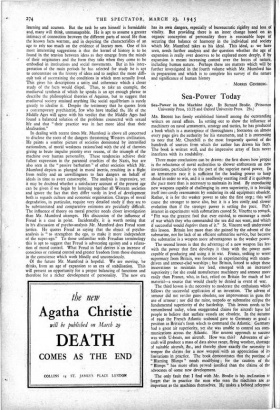Sea-Power Today
Sea-Power in the Machine Age. By Bernard Brodie. (Princeton University Press, $3.75 and Oxford University Press. 25s.)
MR. BRODIE has firmly established himself among the outstanding writers on naval affairs. In setting out to show the influence of machinery on naval armaments, strategy and tactics, he has produced a book which is a masterpiece of thoroughness ; footnotes on almost every page give the authority for his statements, and it is interesting to note that Mr. Churchill is the most frequently quoted of the hundreds of sources from which the author has drawn his facts. The book is written well, and the impressive array of facts never interferes with its readability.
Three major conclusions can be drawn: the first shows how proper is the reluctance of naval authorities to shower enthusiasm on new inventions, particularly on the part of the superior naval power. In an armaments race it is sufficient for the leading power to keep ahead in order to win, and it is needlessly exerting itself if it quickens the pace more than is necessary to maintain its lead. By introducing new weapons capable of challenging its own superiority, it is forcing itself into costly rearmament by rendering its old equipment obsolete. Rather, it is for the weaker power to take the first step ; this will cause the stronger to move also, but it is a less costly, and slower evolution than if the stronger power is setting the pace. Pitt's interest in experimentt with submarines caused St. Vincent to remark, "Pitt was the greatest fool that ever existed, to encourage a mode of war which they who commanded the sea did not want, and which if successful would deprive them of it." St. Vincent well understood this lesson. Britain lost more than she gained by the advent of the submarine, not for lack of an efficient submarine service, but because the submarine is a weapon more advantageous to the weaker power.
The second lesson is that the advantage of a new weapon lies less with the power that first develops it than with the power most capable of producing and using it in war. France, seeking to wrest supremacy from Britain, was foremost in experimenting with steam- driven and armour-clad warships ; but Britain, forced to adopt these innovations to maintain her lead, emerged with an increased superiority ; for she could manufacture machinery and armour more easily than France, who, in fact, relied on Britain for much of her material—a source that would clearly be denied in event of war.
The third lesson is the necessity to moderate the enthuiasm which follow; the successful application of an invention. The advent of armour did not render guns obsolete, nor improvement in guns the use of armour ; nor did the mine, torpedo or submarine eclipse the fundamental superiority of the battleship. This lesson needs to be remembered today, when exaggerated claims for aircraft have led people to believe that surface vessels are obsolete. In the autumn of 1940 the French Atlantic seaboard gave to Germany as good a position as Britain's from which to command the Atlantic. Germany had a great air superiority, yet she was unable to control sea com- munications across the Atlantic. Her nearest approach to success was with U-boats, not aircraft. How was this? Advocates of air- craft will produce a mass of data about range, flying weather, shortage of suitable aircraft, &c., and thereby show exactly the necessity to temper the claims for a new weapon with an appreciation of its limitations in practice. The book demonstrates that the pastime of "Blaming Blimps" needs modifying ; for the caution of the " Blimps " has more often proved justified than the claims of the advocates of some new development.
The only fault that I find with Mr. Brodie is his incEnation to forget that in practice the men who man the machines are as important as the machines themselves. He makes a belated reference
to this in his conclusion, but is apt to lose sight of it when gauging the influence of machinery on naval warfare. His judgements on the possibility of invasion in 1940 and on the struggle in the Mediter- ranean lack a proper appreciation of this factor.
G. P. GiuGGs.



























 Previous page
Previous page